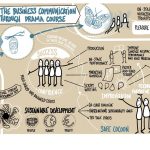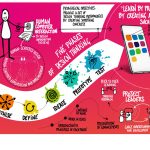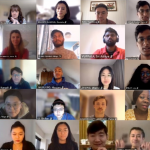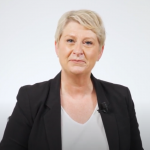
What is human capital?
You are probably familiar with the term, but you may not be entirely sure what it means. Eliane Bacha, Associate Professor of Management and Leadership at SKEMA Business School, explains human capital. Human capital can be defined as the intellectual,…

What is factoring?
You’ve heard the word – but do you really know what it means? Sabrina Chikh, Associate Professor of Finance at SKEMA Business School, as she pulls back the curtain on factoring. The video features French audio, English subtitles are available…

The one course that teaches you the top digital skills to start your career
Pedagogical innovation at SKEMA is closing the gap between academic knowledge and real-world demands. Innovative workshops, on tools like Notion and ChatGPT, teach students skills to thrive in today’s job market. And guess what? Students were particularly engaged. The spark…
Les plus lus
Breaking out of the chrysalis: How theater can transform a student

Digitalisation in higher education: How I redesigned Design Thinking by creating apps prototypes with my students?

Consilience or “the unity of knowledge”: an approach to complexity, a critical compass, a course of action

Slavery and cognitive dissonance

Theory U: How to accompany students in the face of uncertainty?

Empowering students to become active players in their training?

Medias
All articles

Science in the era of sensationalism
Freakonomics is a word for an original way to view the world, by uncovering the influence of economic prompts and cognitive biases in particular on our choices. This type of research purports to reveal unconscious or unexpected factors that are confirmed by scientific studies, and this makes it even more intriguing. But as the astronomer Carl Sagan highlighted, the problem is that “extraordinary claims require extraordinary evidence”. And such evidence does not always exist, as we will see.

MODERN SLAVERY, any of your Business Education?
What is Modern Slavery?
What has it got to do with business?
What is being done about it in business and management education and research?

360 Learning: Achieving mastery in different ways
In the past Financial Modelling courses I taught, I would always use the same case study for the exams, but often felt the limitations of this. What I wanted for my students was a challenging multi-faceted activity that would make them apply critical thinking in different ways.

Digitalisation in higher education: How I redesigned Design Thinking by creating apps prototypes with my students?
I had once gone to 2-day Design Thinking workshop where the theme was Transportation. Unfotunately, at the end of the journey I still found myself thinking that the problem we tackled was too abstract and the work done during the designing thinking phases too superficial. So when I was asked to teach a Design Thinking course, I really wanted to make sure that my students maximised the value of the design thinking method.

Judgment rather than memorization of rules: How to dispel misconceptions about accounting
Since the mid-2000s, corporate financial reporting in many countries around the world is regulated by International Financial Reporting Standards (IFRS). This means teaching an international set of standards to an international audience. Interviewing practitioners and leading academics allows me to demonstrate the diversity of practice hidden behind the homogeneity of the rules and the need for judgment.

Is playing working? Let’s talk about gamification
Everybody knows Kahoot!, but there are many more tools that you can use to gamify your lessons....

Slavery and cognitive dissonance
In the field of social psychology, cognitive dissonance is the tension experienced by an individual when their thought system, feelings or behaviour are conflicting. In its own way, slavery placed our societies in a state of cognitive dissonance: the proclamation of human rights coexisted with the reduction of people to the status of objects deprived of rights. To this day, this reality is often overlooked.

Tattoos and the decline of religion
Over the course of the 20th century, a spectacular decline in religious practice occurred within Western societies. Numerous studies now indicate that this trend is escalating. A multifactorial analysis provides a better understanding of what is driving this (r)evolution...

How we organized a real-world business case for 1400 students across three different campuses?
Twenty-five centuries ago, Confucius is reputed to have said “I see, and I forget, I hear, and I remember, I do, and I understand”. Learning-by-doing goes under the many names: project-based learning, student-centric pedagogy, problem-based education. But how exactly do you get students to engage in active learning?

The military, intelligence and consilience
In these times of great uncertainty, everyone is seeking to better anticipate the future. In the military and intelligence fields, it is striking that, besides tactical or technological solutions, top officials are adopting transdisciplinary approaches similar to consilience.

Breaking out of the chrysalis: How theater can transform a student
In 2018, we co-created a pedagogical innovation, The Business Communication Through Drama course. It was designed to help business school students further develop their English language communication skills in addition to acquiring professional competencies through the medium of drama. Why…

One statistic can hide another
The use of statistics is crucial for anyone wishing to understand how society is evolving. They should be analysed very meticulously though, because the devil is in the detail and one statistic can hide another. Here is a demonstration.

Discourse and Method
By reinventing our learning system, the SKEMA faculty is first of all giving learners the means to navigate a complex world (more broadly speaking, VUCA), by extending the school’s teaching beyond the disciplines of administration and management, and to develop their critical thinking abilities by exposing them to the realities of the world.

Does studying abroad help students to become global citizens?
It is undeniable that studying abroad is a rich and valuable experience for our students, enabling them to adapt and work well in multicultural environments and encouraging greater open-mindedness and cultural awareness. However, we noticed that the students were often unable…

Consilience or “the unity of knowledge”: an approach to complexity, a critical compass, a course of action
In a complex world, it is no longer possible to content ourselves with deeper but disjointed knowledge. Consilience or “the unity of knowledge” is a way to approach the problems and challenges of our time by interconnecting fields of knowledge…

How does playing esports promote the development of soft skills?
Isolation, deviant behaviour… Video games and esports tournaments don’t always get a good press. Although deviance and risk behaviours are very much present, this viewpoint too often eclipses the positive aspects of gaming and more particularly its educational value when…






